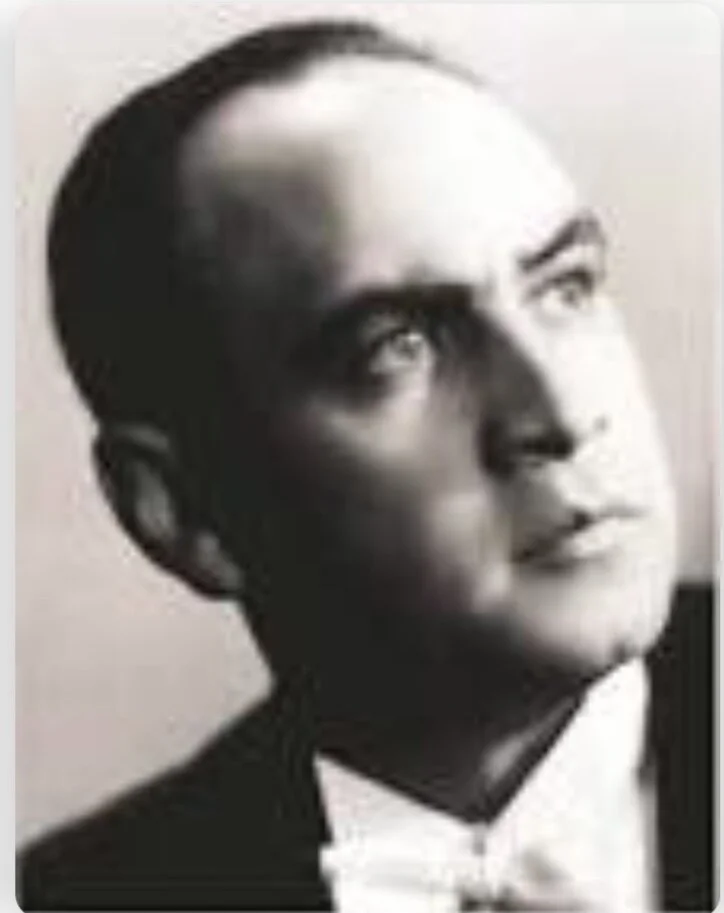Pavel Lisitsian : Advent Calendar of Song: Day Twenty-Three
NEWSFLASH: This series will now run on through the Twelve Days of Christmas, stopping (yes, positively a final farewell appearance) on January 6.
Several of you have spoken of purity in voices, but giving very different examples. In some cases, I’m left thinking “Well, I love that singer, but I’d never call his voice pure.” In others, I think “It couldn’t be purer, and I hate it.” To me, several kinds of vocal purity seem to me sins of omission. I’m too aware of what’s being left out, especially in the lower parts of the voice.
A topic I haven’t touched on before is sexiness. I haven’t raised it because in many voices there’s too much going on for us to spend time on whether the sound is seductive or sensuously exciting; and obviously we’re all turned on by different types. But, as in dance and acting, it’s an issue. What the critic has to address are the values underlying sexiness: is this artist inspiringly heroic? romantically tender? insipidly pretty? effortlessly sensuous? I can’t say whether you’ll want to go to bed with today’s singer, but I can say something about what he embodies.
I discovered several of this month’s singers (La Niña de las Peinas, Josephine Baker, and at least one to come) through my friend Sally Rettig, who ran a London record shop (Caruso & Co). (For five years, she was also my landlady, after which I moved only two blocks away; and I loved visiting her on returns from New York.) She was a formidably intelligent enthusiast, who loved all the performing arts and was a good friend to many artists – dancers, actors, choreographers, singers, administrators, even critics. But the photograph she kept by her bed was of today’s singer, the Armenian baritone Pavel Lisitsian (1911-2004).
Lisitsian, a longterm star of the Bolshoi, is today globally admired. In the days of the Soviet Union, when only a few Soviet recordings slipped out to the West, he was often unknown or little known even among connoisseurs. Now that he’s no longer among us, it’s not hard to find him. I have his complete recordings of the operas La Traviata, Aida, Faust, Carmen, The Queen of Spades, Kastchey the Immortal, Sadko, La Bohème, War and Peace, all with Bolshoi forces. But Sally knew about him in the 1970s. The first time she visited my then flat, in 1982, she brought some Lisitsian LPs to lend me. I'd never heard him before.
I think that most of you can hear why his voice sounds sexy to many. Gorgeously, it unites the full virile sound of his thorax with the effortlessly speaking face. But I think you can also hear why sex appeal is at most a secondary factor here. Possibly in the theatre his wasn’t a vast voice, but it’s dark, full, and direct. He employs no “operatic” artifice (distorted vowels etc.) to manufacture some important noise. And his phenomenal steadiness of breathing registers as psychological strength. Only in Sadko, where he's just a Venetian Guest who arrives, delivers a exotically enticing aria, and departs, does sexiness become his primary quality.
Lisitsian wasn’t a vocal chameleon, as were Mattia Battistini and Tito Gobbi; but he could subtly change his very recognizable sound to be savagely patriarchal (in Aida), swaggeringly macho (in Carmen), nobly devoted (in Queen of Spades), courteously patriarchal (La Traviata). In La Traviata, he opens his aria by singing what are usually four separate phrases in a single breath, but we don’t hear any gasp or sound as he then breathes in. The effect is not virtuosity but inevitability.
Here https://www.youtube.com/watch?v=ipf1ufoE7wg he’s Yeletsky in Tchaikovsky’s The Queen of Spades(Pique dame). This is a role that was also sung superbly by the late Dimitri Hvorostovsky, a yet more personally handsome baritone with a lustrously seductive voice and famously long breaths, whom I saw in at least ten roles, some of them several times; I often bravoed him. You can hear (and see) Hvorostovsky sing this on YouTube; we’re lucky to have has this aria sung by two such marvels. Still, when you turn back from Hvorostovsky to Lisitsian, you find not just that it’s Lisitsian who seamlessly links the two climactic phrases into one (2.23- 2.37) - sweeping down into the second phrase with a liquid portamento - but that his diction is also more like direct speech, his vocal tone less covered and less consciously orotund.
ELETSKY/ YELETSKY
Ya vas lyublyu, lyublyu bezmerno,
Bez vas ne myslyu dnya prozhit,
Ya podvig sily bezprimernoi
Gotov seichas dlya vas svershit,
No, znaite: serdtsa vashevo svododu
Nichem ya ne khochu stesnyat,
Gotov skryvatsya vam v ugodu
I pyl revnivykh chuvstv unyat,
Na vsyo dlya vas gotov ya!
I love you, love you beyond all measure,
I cannot conceive a day without you,
I am ready to accomplish for our sake
A heroic task requiring matchless strength.
But be assured I do not wish in any way
To restrict the liberty of your heart,
I am ready to hide my feelings in order to please you
And master the heat of jealousy,
I am ready to do an thing, anything for you!
Ne tolko lyubyashchim suprugom,
Slugoi poleznym inogda,
Zhelal by ya byt vashim drugom
I uteshitelem vsegda.
I should like to be not simply a loving husband
Or sometimes a useful servant,
But your friend and always sour consoler.
No yasno vizhu, chuvstvuyu teper ya,
Kuda sebya v mechtakh zavlyok,
Kak malo v vas ko mne doverya,
Kak chuzhd ya vam i kak dalyok,
Akh! Ya terzayus etoi dalyu,
Sostrazhdu vam ya vsei dushoi,
Pechalyus vashei ya pechalyu
I plachu vasheyu slezoi!
Akh! Ya terzayus etoi dalyu,
Sostrazhdy vam ya vsei dushoi!
Yet I see clearly and feel it now
How I allowed myself to be misled by my dreams,
How little trust you have in me, how alien and
How remote I seem to you.
Oh! I am tormented by this remoteness,
All my soul shares in your suffering,
Your sadness is mine.
Your tears, I weep them too!
Oh! I am tormented by this remoteness.
All my soul shares in your suffering!
Ya vas lyublyu, lyublyu bezmerno,
Bez vas ne myslyu dnya prozhit,
Ya podvig sily bezprimernoi
Gotov seichas dlya vas svershit,
I love you, love you beyond all measure,
I cannot conceive a day without you,
I am ready to accomplish for our sake
A heroic task requiring matcªhless strength.
Length of breath in singing is something that impresses us who’ll never have it. Occasionally I’ve needed to go back and time a singer’s single breath; it’s rare that anyone keeps a breath going for fifteen seconds or longer – those that I remember doing so include Fernando de Lucia, Enrico Caruso, Rosa Ponselle, Maria Callas, Heather Harper, Lisitsian, and Hvorostovsky. (There are multiple versions of this aria by Hvorostovsky on YouTube. On at least one, he strings a later series of phrases onto an even longer single breath than Lisitsian’s big one here.) Once you get past the sheer athleticism of it, though, length of breath isn’t very important unless it’s expressive. (Lotte Lehmann was generally short-breathed, but, in a good way, often gave the opposite impression. Some other singers have better lungs than artistry.) In his aria from Ernani, de Lucia does a quiet cadenza that just sounds like “Ah!” for ten second, ardent and inward and wonderful – but then that “Ah” turns into “Ahimé” (“Alas”) over the final five seconds, as the expression turns into innermost anguish: an astonishing feat.
With Lisitsian, the length of phrase is usually to do with character, with strength of purpose. Here, though, he’s Yeletsky, the noble lover who loves in vain. In his climactic phrase, he’s singing “All my soul shares in your suffering, Your sadness is mine.” His emotion is hopeless, but he pours it forth with supreme generosity and largeness of heart. His ends the aria by repeating "Ya vas lyublyu" ("I love you"; "Je vous aime") in amessa di vocespanning twenty seconds. There's a tiny pause before the pp "lyublyu", so this isn't a breath for the records. But what an ending he makes it! "Vas" ("You") is where he pours fourth his spirit yet again; then "lyublyu" ("love") is the word he plants quietly in the ear.

